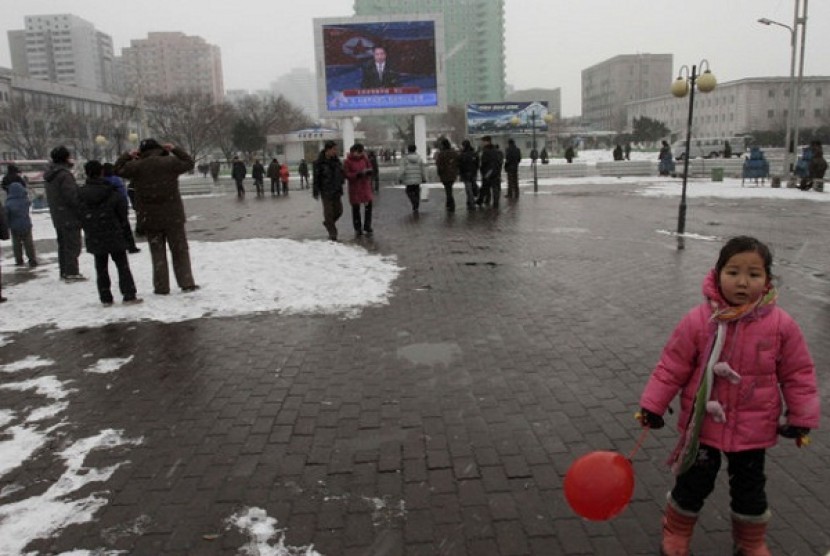REPUBLIKA.CO.ID, PYONGYANG - Defying UN warnings, North Korea on Tuesday conducted its third nuclear test in the remote, snowy northeast, taking a crucial step toward its goal of building a bomb small enough to be fitted on a missile capable of striking the United States. The test is North Korea's first since young leader Kim Jong Un took power of a country long estranged from the West.
In Pyongyang, where it was snowing Tuesday, North Koreans gathered around televisions to watch a 3 pm TV broadcast announcing the nuclear test. The test will likely be portrayed in North Korea as a strong move to defend the nation against foreign aggression, particularly from the US.
"The test was conducted in a safe and perfect way on a high level, with the use of a smaller and light A-bomb, unlike the previous ones, yet with great explosive power," North Korea's official Korean Central News Agency said, confirming speculation that seismic activity near Kilju around midday was a nuclear test.
The test shows the world that North Korea is a "nuclear weapons state that no one can irritate," Kim Mun Chol, a 42-year-old Pyongyang citizen, told The Associated Press in the North Korean capital. "Now we have nothing to be afraid of in the world."
North Korea said the atomic test was merely its "first response" to what it called US threats, and said it will continue with unspecified "second and third measures of greater intensity" if Washington maintains its hostility.
The underground test, which set off powerful seismic waves, drew immediate condemnation from Washington, the UN and others. Even its only major ally, China, voiced opposition.
President Barack Obama, who was scheduled to give a State of the Union address later Tuesday, said nuclear tests "do not make North Korea more secure." Instead, North Korea has "increasingly isolated and impoverished its people through its ill-advised pursuit of weapons of mass destruction," he said in a statement.
North Korea claimed the device was smaller than in previous tests; Seoul said it likely produced a bigger explosion. The test was a defiant response to UN orders to shut down atomic activity or face more sanctions and international isolation.
It will likely draw more sanctions from the United States and other countries at a time when North Korea is trying to rebuild its moribund economy and expand its engagement with the outside world.
UN bans the nuke test
Several UN resolutions bar North Korea from conducting nuclear or missile tests because the UN Security Council considers Pyongyang a would-be proliferator of weapons of mass destruction and its nuclear testing a threat to international peace and stability. North Korea dismisses that as a double standard, and claims the right to build nuclear weapons as a defense against the United States, which has been seen as enemy No. 1 since the 1950-53 Korean War. The US stations more than 28,000 troops in South Korea to protect its ally.
It wasn't immediately clear to outside experts whether the device exploded Tuesday was small enough to fit on a missile, and whether it was fueled by plutonium or highly enriched uranium. A successful test would take North Korean scientists a step closer to building a nuclear warhead that can reach US shores —seen as the ultimate goal of North Korea's nuclear program.
In 2006, and 2009, North Korea is believed to have tested devices made of plutonium. But in 2010, Pyongyang revealed a program to enrich uranium, which would give the country a second source of bomb-making materials — a worrying development for the U.S. and its allies.


